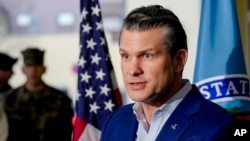World leaders are making a mistake if they conclude that an effort by U.S. President Donald Trump to review America’s global military posture means Washington is pulling back, according to Defense Secretary Pete Hegseth.
Hegseth Tuesday spoke to reporters in Stuttgart, Germany, home to the headquarters for U.S. European Command and U.S. Africa Command, the first stop on his first international trip since being sworn-in last month.
"We would be remiss in not reviewing force posture everywhere, but it would be the wrong planning assumption to say America's abandoning something or America's leaving,” Hegseth said.
“No, America's smart to observe, plan, prioritize and project power where we need to deter conflict,” he added.
The comments come ahead of key meetings Wednesday and Thursday in Brussels of NATO defense ministers and of the Ukraine Defense Contact Group, a group of almost 50 countries who have pledged to support Ukraine in its efforts to repel Russia.
U.S. defense officials have said Hegseth is expected to press NATO allies to take more of a leadership role in confronting challenges in Europe and also to increase defense spending — something the U.S. defense chief emphasized in Germany.
"The European continent deserves to be free from any aggression. But it ought to be those in the neighborhood investing the most in that individual and collective defense," Hegseth said. "That's common sense.
“You defend your neighborhood, and the Americans will come alongside you in helping in that defense," he said.
But whether that means the U.S. will maintain a robust military presence across Europe is unclear.
Hegseth said Trump’s push for a “rapid peace deal in Ukraine” could allow the U.S. to shift resources to counter the rising threat from China in the Indo-Pacific.
China threat
“There's just no doubt the communist Chinese ambitious ambitions are robust," Hegseth told reporters. “Their view of the world is quite different than ours, and whoever carries that mantle is going to set the tone for the 21st century."
He also called out Beijing for what he called pernicious intentions in Latin America and across Africa.
“America's posture there, along with allies and partners, is going to matter about contesting that space," he said.
Terrorism in Africa
Hegseth also left open the possibility that the U.S. could maintain a military presence in Africa, including Somalia, despite Trump’s decision to pull U.S. forces from the country during his first term.
"Africa is very much the front lines of a fight from Islamists," Hegseth said. "We're not going to allow them to maintain a foothold, especially to try to strike at America."
The U.S. currently has about 500 special operations forces in Somalia, helping government forces push back against the Islamic State terror group’s Somali affiliate and against al-Qaida linked al-Shabab.
“I want to listen to the commanders on the ground, first and foremost," Hegseth said, adding that while the U.S. will keep forces where they are needed, there’s a preference to “do counterterrorism effectively over the horizon.”
Earlier this month, U.S. airstrikes targeted a senior Islamic State planner in the Somalia’s Golis mountains.
Defense spending
Hegseth on Tuesday also pledged to find ways to make U.S. defense spending more efficient, saying he will welcome the help of Elon Musk, the multibillionaire running Trump’s non-governmental Department of Government Efficiency, or DOGE.
“I hope to welcome Elon to the Pentagon very soon," he said. “There is waste, redundancies and headcounts in headquarters that need to be addressed."
As an example, Hegseth pointed to Pentagon programs focused on addressing climate change.
“The Defense Department is not in the business of climate change, solving the global thermostat,” he said. "We're in the business of deterring and winning wars."
He added, however, that efforts to cut waste would not be “to the detriment of American operational or tactical capabilities.”
Even while cutting waste, Hegseth said, the U.S. needs to spend more on defense — calling for spending at least 3% of gross domestic product (GDP).
The Trump administration has been calling for NATO allies, many of which have lagged behind the U.S. on military funding, to spend at least 5% of GDP on defense.






